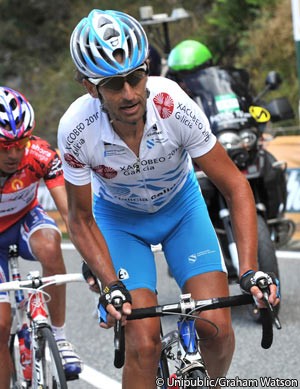Spanish rider looks set to serve total suspension of over three years
 The 2010 Vuelta a España runner-up Ezequiel Mosquera, who looks set to have that result taken away after his positive test for hydroxyethyl starch, has implied that he could walk away from the sport after being handed a two year sanction.
The 2010 Vuelta a España runner-up Ezequiel Mosquera, who looks set to have that result taken away after his positive test for hydroxyethyl starch, has implied that he could walk away from the sport after being handed a two year sanction.
Earlier this week the Spanish rider was officially informed by the national federation RFEC that he had been given a 24 month ban. This sanction is reportedly in addition to the time he has already spent off the bike waiting for a resolution to the case, namely the fourteen months since the 2010 Vuelta.
Given that the ban is effectively greater than three years and the standard sanction for doping offences has typically been up to two years, he feels that he is being punished severely.
“I always said I would retire riding a bike, but with the sanction of two years and already being 35, you have to be realistic,” he said, according to Marca. In fact, he turned 36 eight days ago, meaning he would be 38 when his ban ends.
Mosquera continues to maintain his innocence of willingly taking the masking agent, although his defence is undermined by the fact that his-then Xacobeo Galicia team-mate David Garcia also tested positive for hydroxyethyl starch in the same race. Close analysis of his samples subsequently showed he had artificial EPO in his system. Authorities were unable to detect the same with Mosquera.
Ironically, Garcia was handed a two year ban rather than the longer sanction his team captain now faces.
Mosquera has indicated that he might take the case to general Spanish courts, as well as the Court of Arbitration for Sport. He accepts that as things stand, there are those who will doubt his version of events.
“You can defend your innocence to the hilt, but people have absolute freedom to believe you or not,” he stated.
Mosquera was due to race with Vacansoleil this season, although he never donned the jersey in competition. The team was set to fire him once a sanction was made official.